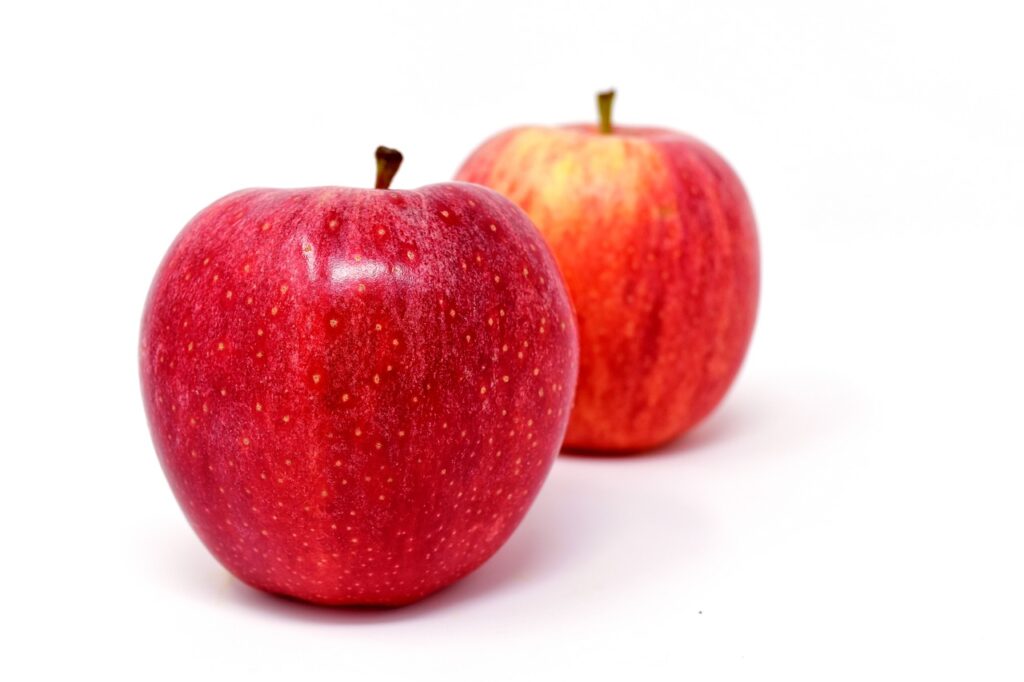What Are Apples Good For?

It is said to, “eat an apple a day, to keep the doctor away.” Apples (malus domestica) are one of the most popular fruits as they are crunchy and delicious. Grown throughout the world, apples are high in fibre, vitamins, minerals, and antioxidants. They’re fat-free, cholesterol-free, and low in sodium. The health benefits of apples are profound and so eating apples is a smart part of a healthy lifestyle.
Nutritional Content
One medium apple (182grams) contains the following nutrients:
- Calories: 95
- Carbs: 25g
- Fibre: 4g
- Vitamin C: 14% of the Recommended Daily Intake (RDI)
- Potassium: 6% of the RDI
- Vitamin K: 5% of the RDI
Apples also contain manganese, copper, and the vitamins A, E, B1, B2, and B6. They also contain phytochemicals such as, quercetin, catechin, and anthocyanin which provide the majority of their beneficial effects. Quercetin is a flavonoid; a type of naturally occurring plant chemical that has antioxidant and anti-inflammatory effects. Pectin is a type of soluble fibre that may help prevent constipation and lower the “bad” cholesterol (LDL). Pectin is also fermented by beneficial bacteria in the large intestine forming short chain fatty acids that may play a role in the prevention of chronic diseases, including certain cancers and bowel disorders.
In order to get the most benefits from eating apples, the peel should always be eaten as it contains half of the fibre and most of the phytochemicals.
Health Benefits of Apples
The health benefits of apples include the following:
1. May Improve Digestion
Many of the health benefits of apples are derived from the soluble fibre pectin. This soluble fibre works wonders for your digestion as it absorbs water from the intestines thus forming a gel. This helps to slow down digestion and, as it increases the stool bulk, it stimulates peristalsis (the contraction of the intestines) which pushes the stools through the intestines thus preventing constipation.. Apples also contain malic acid which improves stomach digestive functions by supplying enough hydrogen for stomach acidification.
2. May Protect Eye Health
Just one apple with its peel contains 4-5 grams of fibre. This is the most important nutrient in keeping your bowels working smoothly. Keeping yourself regular without relying on harmful laxatives could be as easy as replacing your afternoon snack of crisps with a crisp, delicious apple.
Apples are also good for diarrhoea thanks to the soluble fibre pectin. This has congealing effects in the intestines which helps to firm up the intestinal contents and return the bowel function back to normal. Applesauce is actually the best apple product for diarrhoea as it’s made without the high-fibre skin; but beware that some brands of applesauce add large amounts of sweeteners, and too much refined sugar can make the diarrhoea worse.
3. May Help Keep Your Body Young
Apples contain powerful antioxidants such as vitamins C. Antioxidants are substances which neutralise free radicals in the body. These are harmful compounds that cause oxidative stress and damage the cells. Environmental factors, such as the sun and pollution, are the principle causes of wrinkles and skin damage. The powerful antioxidants found in apples may protect the skin from oxidative damage. Antioxidants therefore provide protection from many of the diseases that seem to be a part of aging.
4. May Reduce the Risk of Some Cancers
Studies have shown that antioxidants may help reduce the risk of some types of cancer as they neutralise the harmful effects of free radicals.
When scientists compared the levels of antioxidants in a 1,500mg vitamin C supplement to one small apple, they found that the antioxidant values were equal. This means that a fresh apple has more than 15 times the antioxidant power of the recommended daily dose of vitamin C.
Research has shown that there is a link between eating apples and the reduced risk of certain cancers, specifically colorectal cancer, due to the high flavonoid content. It is thought that their antioxidant and anti-inflammatory effects may be responsible for this. Flavonoids work against cancer cells by influencing cellular processes such as cell proliferation and cell differentiation.
Researchers also found that an ordinary apple was able to stop the growth of colon and liver cancer cells in test tubes. Unpeeled apples were especially effective.
5. May be Good for Weight Loss
Fruits (especially those with an edible peel) are high in fibre. Fibre takes a long time to digest and so the high fibre content makes you feel full for longer. Apples give you a feeling of fullness as they are 86% water and have a high fibre content. In fact, studies have shown that people who ate apple slices before a meal felt fuller than those who did not. In addition, they showed that people who started their meal with apple slices ate on average 200 fewer calories than those who didn’t and, even though they ate less calories, they still felt fuller than those who ate more.
6. May Help Reduce Cholesterol
The soluble fibre pectin, and other constituents such as the antioxidant polyphenols (flavanoids) can reduce the levels of “bad”(LDL) cholesterol and slow down its oxidation. This further helps reduce the risk of the hardening of the arteries, damaging heart muscles and blood vessels. Studies have shown that high intakes of flavonoids can lead to a 20% lower risk of stroke.
7. May Improve Cardiovascular Disease
Flavonoids are one of the most important naturally occurring phytochemicals in fruits and vegetables and studies have shown that the flavonoids in apples may help protect against cardiovascular disease. The magnesium and potassium in apples help to regulate the blood pressure and keep the heart beating steadily, and the flavonoid quercetin, a naturally occurring antioxidant, protects the artery walls from damage and keeps the blood flowing smoothly.
Adding flavonoid-rich foods such as apples to your diet has been scientifically proven to lower your risk of heart disease. A study with Japanese women who ate foods high in quercetin found that they were less likely to get coronary heart disease than women who did not include them in their diet, and they also had lower levels of total and LDL (or bad) cholesterol.
8. May Lower the Risk of Diabetes
Several studies have shown that eating an apple a day may reduce the risk of developing type 2 diabetes by 28%.
It is thought that this protective effect is caused by the polyphenol anthocyanin which is a powerful antioxidant. The beta cells in the pancreas, which produce insulin, are usually damaged in type 2 diabetics and so it is suspected that the polyphenol anthocyanin protects the beta cells in the pancreas from damage.
9. May Be Good for Bone Health
Eating fruit is linked to higher bone density, which is a marker of bone health. It is thought that apples may play a role in strengthening bones. Phlorizin, a flavanoid found in apple peel, may help prevent bone loss associated with menopause as it may fight the inflammation and free radical damage that leads to bone degeneration.
10. May Boost Brain Power
Studies have shown that apples may improve memory as they may increase the levels of acetylcholine, a neurotransmitter that can decline with age. Low levels of acetylcholine are linked to Alzheimer’s disease. Increasing the levels of acetylcholine may enhance communication between nerve cells and the brain which may improve memory and lower the risk of developing Alzheimer’s. Homemade apple juice without any additives (not store-bought juices) may have benefits for age-related dementia.
Cautions
Apples are one of the most pesticide-contaminated foods. According to the Environmental Working Group (EWG), apples rank fifth in their 2020 “Dirty Dozen” for pesticides found in produce. Therefore, it is important to buy certified organic apples in order to protect your health.
Summary
Apples are a healthy fruit which are very good for you. Eating them is linked to a lower risk of major diseases such as diabetes and cancer. Despite these benefits, it’s important to consume apples in moderation as they contain fructose, which can be detrimental to your health in excessive amounts.
In order to obtain the maximum benefits from apples, the whole fruit should be eaten (flesh and peel).
